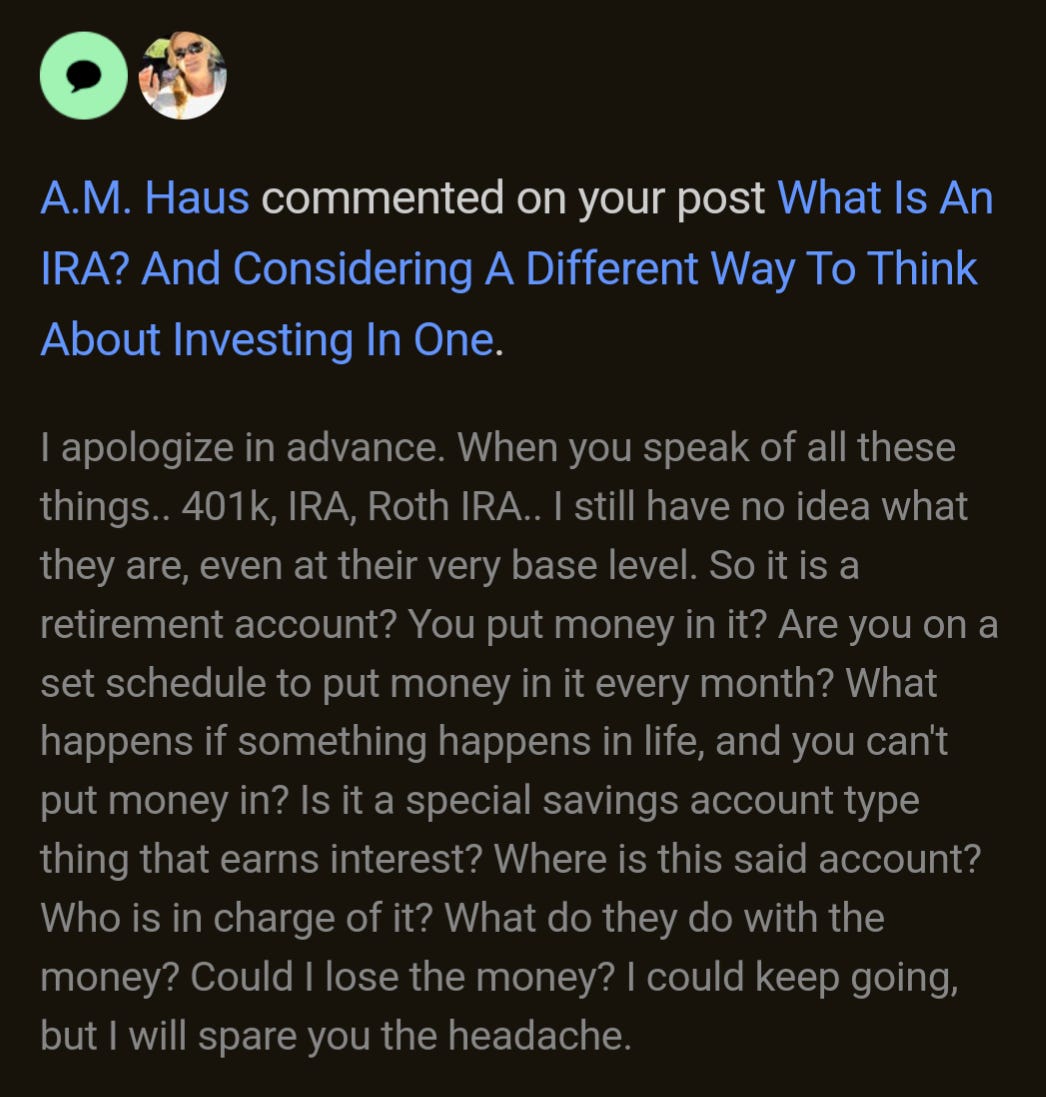10 Personal Finance & Investing Basics For People Who Will Never Retire: Living The Semi-Retired Life
Starting today with retirement accounts
For February—in between installments from Spain and France—I promised 10 detailed posts on investing, saving and work-related semi-retirement income streams.
I also said I’d leverage the work I’m doing for CNN Underscored to (a) help promote that endeavor and (b) illustrate basic-to-intermediate personal finance and investing.
Here’s how I will do it, starting today and with nine more posts this month.
I will link to and sometimes include small portions of CNN articles to provide the basics.
Read those articles in their entirety for additional color around the more traditional approach.
Read the newsletter posts for how I view these personal finance & investing concepts and strategies within the Never Retire: Living The Semi-Retired Life context.
This approach accomplishes several things: It brings a few people to the CNN effort, which I’m thrilled to be part of. And it serves two types of subscribers—those with relatively little knowledge around these subjects and those with whatever level of knowledge who find alternative approaches interesting.
Here’s the rundown of what we’ll cover, starting with today’s post—
The Ins And Outs Of Retirement Accounts
Which Types Of Savings Accounts And Strategies Make The Most Sense For You?
The Most Basic Stock Market Tutorial That's Anything But Basic
Investing Can Make Sense, But Maybe You Just Shouldn't Be Buying Stocks
Earning 'Passive' Income By Investing In Retirement Isn't Easy (will appear on February 7th in
’s publication).Investing In Retirement Is A Full-Time Job
The Financial Community Is Slowly Embracing The 'Never Retire' Reality
The Reasons Why I Don't Invest In The Stock Market
A $1.2 Trillion Dollar Industry That Might Make Your Semi-Retired Life Easier
Taking Risks With Money And In Life
The constant through it all is that one size does not fit all. Do additional research to determine what works best in your situation because all I can provide certainty on is what I think works in my situation.
Part of the inspiration for this series has been comments like this I receive to personal finance & investing installments where I either don’t include or gloss over the basics. It’s difficult to execute the traditional path and—even more so—take an alternative route without a foundational understanding of basic accounts and concepts.
My CNN work is most valuable to help answer
’s questions. I have written at least five articles in the last few months on the basics—and then some—governing individual retirement accounts (IRAs) and 401(k)s. The latter tied to employment and the former an account designed for retirement savings that anyone can have, as long as they meet Internal Revenue Service (IRS) rules and qualifications, particularly around income. The CNN articles detail the IRS guidelines so we won’t get into them here.Why is the IRS involved? Because these accounts all come with tax advantages.
Let’s take the CNN articles one by one, including a key excerpt or two from each. Head to the actual article for much more explanation and detail on each excerpt. The CNN stories will likely answer any questions you have after reading the quoted sections. They’re super thorough. Paul and David are the fantastic editors I work with.
There’s an investment product, available to millions of U.S. employees, that can help you achieve your retirement goals: It’s called a 401(k) plan.
To benefit from a 401(k), you need a job with an employer who offers a plan and the willingness to commit a relatively small portion of your salary to your account on a regular basis.
Like many programs in America, a 401(k) plan is linked to employment. Like healthcare and two weeks vacation, it’s a benefit some employers offer their employees.
… Many employers offer 401(k) plans designed to help employees save and invest for retirement while realizing tax benefits in the process. Participating employees regularly contribute part of their income to their 401(k)s, and employers often match some or all of those contributions …
Your employer offers a 401(k) as a benefit. You choose to enroll. At the time of enrollment, your employer provides you a list of investment options available for your 401(k).
There are other types of workplace retirement plans that function similarly to 401(k)s.
Private employers sponsor 401(k) plans. Nonprofits, schools and churches offer 403(b) plans. Known as defined contribution (DC) plans, employees — and sometimes employers — contribute to the employee’s account, which includes features and tax benefits that can boost retirement savings …
Employer match is another benefit of 403(b)s and 401(k)s. While not obligatory, many employers match employee contributions. The match can be dollar for dollar, partial or both. For example, an employer may offer a 100% match on the first 2% of employee contributions, then 50% on the next 3%.
You can see why the employer match feature of workplace retirement accounts is such a big deal. It amounts to free money that increases your base savings and, subsequently, your potential investment returns.
Of course, not everyone has access to a 401(k) or 403(b), not to mention the similar 457(b), which is generally available only to some government employees. Or you’ll have access to one, but wonder if you should use it, some type of IRA or some other saving or investment vehicle.
So—
At a basic but very important level, a retirement plan is a long-term saving and investing strategy with the goal of accumulating enough money to leave the workforce and still cover your expenses until you die. Tall order. Without the impact of time and, typically, a good amount of money, many people struggle to achieve a sustainable, let alone comfortable, retirement.
The best retirement plans give workers a leg up via powerful advantages and benefits that aid and accelerate the retirement planning process.
Right after that wonderful of piece of financial writing (!), there’s an incredibly handy chart David put together that details every type of retirement plan—even beyond IRAs and 401(k)s—noting who each one is for alongside the main feature of each. Follow this link to the full CNN article for that.
Lots of info, which often results in people deciding on an IRA, but not knowing which of the two main types they qualify for—(you sometimes can have both)—or which one makes the most sense for their situation—
The above CNN article goes into detail about the two main types of IRAs (similar to the two types of 401(k)s described earlier) as well as eligibility requirements, contributions limits, the rules around using both a workplace plan and IRA and much more.
Finally, the article of the bunch that helps readers decide between Roth IRAs, which leads to the way I view retirement accounts as someone who will Never Retire and, as a result, decided on Living The Semi-Retired Life.
Our analysis of the best Roth IRA accounts in 2024 considers the broad features banks, brokerages and emerging financial technology (fintech) firms provide alongside these accounts. We take a “whole-firm” approach because most Roth IRA providers offer similar features not only for your Roth but for many of your other money needs as well.
To find the best Roth IRA for 2024, we get specific and situational on key considerations, such as fees and support. As it turns out, old-school firms such as Vanguard are keeping up with the innovation pioneered by robo-advisors, led by Betterment initially and, more recently, SoFi.
I’m proud of the analysis we did here to come up with the best Roth IRA providers for different types of people looking for different things in an investment firm. So I hope you’ll check out the story, particularly if you’re thinking about opening a Roth IRA.
Which leads into how I view retirement accounts within the context of Never Retiring and Living The Semi-Retired Life. Sounds paradoxical, but it really isn’t.
As one example, a Roth IRA isn’t an investment. It’s an account that contains specific investments, be it stocks, mutual funds, ETFs or something else. The account plays by certain IRS rules that can impact your financial situation, particularly taxes, investment returns and how/when you can access your money. The CNN articles outline these rules.
Just because you’ll Never Retire doesn’t mean you shouldn’t use some type of retirement account. There’s nothing wrong with turning 60 and having $200,000 in a retirement account. Maybe you can’t fully retire on that, but it’s a solid chunk of change to have access to.
On the other hand, many of us who Live The Semi-Retired Life have similar mindsets and attendant views on how to manage money. In our cases, psychology plays a major role, which means it makes little emotional—and logistical—sense to go through the motions of contributing to an account where you can generally only access your money penalty-free (and sometimes tax-free) at retirement.
I go into detail on that last bullet point here—
As someone who will Never Retire, I don’t have a large retirement nest egg. Priority number one with the money I’m saving is to accumulate enough of it—along with my wife—to buy an apartment in Spain for cash or close to it within a few years. Once we do that, I’m open to the idea of probably not one of these retirement accounts (I can’t have one in Spain anyway), but traditional (and often complex) saving and investing tools that can help me organize, manage and grow my money as we head into relative old age, ideally with no or a low housing payment and low overall cost of living.
It’s this type of saving and investing we’ll detail—with the help of my CNN work—in many of the nine forthcoming installments in this February series.
Today’s the travel day from Los Angeles to Barcelona. If all goes well, by the end of tomorrow morning (afternoon in Spain), we’ll be in Spain to kick off our February-long trip. So, in addition to the 10 personal finance & investing installments, expect a minimum of 7 from the seven cities we’re visiting.
For a look at how much this trip cost and how we put it together, check out—














It's funny how they expect you to, in 60 years, pay for college, get married, have two kids, buy a house, and fund two retirements. That's a lot of money (perhaps $5 million).
Thank you for bringing personal finance and "cost of living" to the forefront of the conversation (versus mindless consumerism).
"Once we do that, I’m open to the idea of probably not one of these retirement accounts (I can’t have one in Spain anyway)..."
Does that mean someone emigrating to Spain would have to liquidate their existing account(s), or just leave them inactive? Or is this temporary while on the specific visa you have?